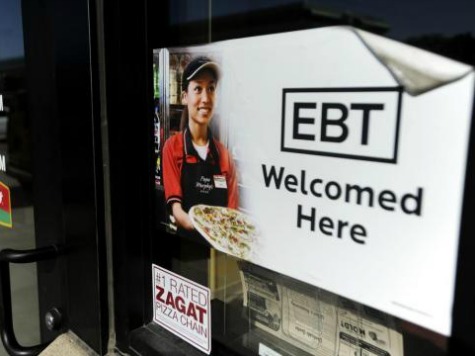
On Monday, the Huffington Post scrambled to tamp down growing opposition to America’s food stamp industrial complex–a system fueled by corporate interests who profit from the poverty programs that have exploded under President Barack Obama.
In a thinly-researched lead article titled “How Food Stamp Resentment Feeds Crabby Conservatism,” author Arthur Delaney presented dusty government studies from the 1990s and pre-Obama Administration food stamp fraud figures to posit that conservatives suffer from “cash register resentment” toward the nation’s 47,727,052 food stamp recipients, because some of them use their benefits to purchase king crab legs.
“The idea is that the poor should feel poor at all times until they’re not poor anymore,” Delaney accused.
The article conceded that “actual food stamp fraud is a real thing” and cited one food stamp recipient who said selling food stamps for cash is widespread. “Everyone I know who’s been on food stamps have been involved in that scam,” said Staten Island resident Carl Clark.
What Delaney ignored, however, is the growing outrage from both the political left and right over the crony capitalism that has cropped up around the food stamp program (officially known as the Supplemental Nutrition Assistance Program, or SNAP).
According to a report by the Government Accountability Institute (GAI), JP Morgan has made at least $560,492,596 since 2004 processing the Electronic Benefits Transfer (EBT) cards of 18 of 24 states. In an article for the Daily Beast, GAI President Peter Schweizer explained that the three companies that administer the nation’s EBT processing also make big taxpayer bucks on replacement cards, swipe fees, and cash withdrawals for TANF benefits.
“This business is a very important business to JP Morgan,” JP Morgan director of treasury services Christopher Paton told Bloomberg News. “It’s an important business in terms of its size and scale. We also regard it as very important in the sense that we are delivering a very useful social function. We are a key part of this benefit delivery mechanism. Right now volumes have gone through the roof in the past couple of years or so.”
Furthermore, EBT processors are not required to use the aggressive anti-fraud measures used in private banking and credit cards because “that job is left to states’ EBT fraud investigation units (which police recipients of benefits) and the Agriculture Department (which polices retailers).”
As Schweizer explains, anti-fraud enforcement efforts can be described as little more than pitiful:
According to the USDA’s website, the federal food stamp program has “over 100” inspectors to police the nearly 200,000 retailers nationwide that accept EBT cards. For its part, the state of Florida has 63 positions allocated to police over 3 million EBT users. JP Morgan is currently involved in an eight-month pilot project with Florida focused on EBT fraud and abuse. The total staff? Just one JP Morgan employee and five to ten state employees, according to Florida officials. Moreover, critics, such as author James Bovard, say that under President Obama the federal government has tried (unsuccessfully) to thwart states like California, New York, and Texas from implementing commonsense anti-fraud measures, such as requiring those applying for an EBT card to provide finger images.
Schweizer and Breitbart News Executive Chairman Stephen K. Bannon (also a co-founder of GAI) highlighted the anti-cronyism food stamp message in a one-hour Fox News special with Sean Hannity titled “Boomtown 2: The Business of Food Stamps,” which explored the myriad ways companies profit from poverty programs, including the estimated $4 billion a year soda makers make from food stamp users.
The food stamp corporate cronyism meme has caught fire, resulting recently in the defeat of the nearly $1 trillion farm bill, 80% of which would have gone to fund the food stamp industry.
Still, the Huffington Post ignored the massive corporate cronyism that pervades the food stamp industry. Instead, its author, Mr. Delaney, chose to focus on “how cash register resentment becomes crabby conservatism.”

COMMENTS
Please let us know if you're having issues with commenting.